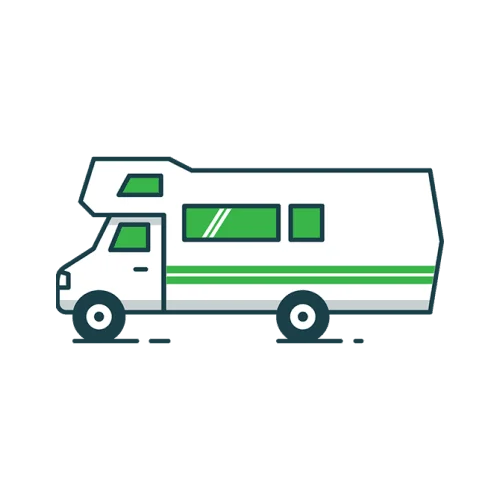Does RV Insurance Cover Water Leaks?
- RV
- /
- Does RV Insurance Cover Water Leaks?
While many RVers do their best to chase the sunshine, there’s no doubt that you’ll eventually run into some wet weather. If that wet weather suddenly makes you realize your RV has a water leak, you could be in a world of trouble while on the road.
Luckily, if you have RV insurance, it could alleviate that pain and pay to repair the damages to your RV and the personal belongings you keep inside. Let’s take a look at everything you need to know.
Does RV Insurance Cover Water Leaks
Yes, RV insurance covers water leaks if you have full coverage insurance and the leak was caused by a covered peril. Three common coverages found within your policy that protect against water leaks are comprehensive, collision and personal effects replacement. Depending on the type of damage that occurred, these coverages could pay to fix the leak and any part of your RV or belongings inside your RV that were affected.
What Kinds of Perils Are Covered?
The most important thing to consider when dealing with water leaks to your RV is how the damage was caused. If your internal water tank suddenly sprung a leak, the damage it causes likely wouldn’t be covered by your RV insurance.
Instead, your manufacturer warranty may be responsible if the leak was caused by a defect. Or you may be financially responsible if the leak was caused by negligence, improper upkeep or simply bad luck. However, RV insurance would likely come into play if the following damages were responsible for the leak.
- Damage caused by multi- or single-vehicle accidents
- Damage caused by natural disasters, such as hurricanes, tornadoes and hail storms
- Damage caused by hitting an object, such as animals or overpasses
- Damage caused by falling objects, such as tree branches or icicles
- Damage caused by fire or smoke
- Damage caused by vandalism
- Damage caused by theft of your vehicle
RV Insurance Coverages for Water Leaks
Three types of RV insurance coverage can help pay for the damage caused by leaks — and there’s one sort of secret coverage that many people have no idea about. The former three coverages are all parts of full coverage insurance, so strictly having liability only will leave you high and dry (or, in this case, wet and damp).
However, if you took out a loan to purchase your RV and you still owe money on that loan, your lender will likely require you to have two of the three coverages to protect both your rig and their investment. But even if you’ve paid off your rig in full, we highly recommend enrolling in these coverages anyway.
While full coverage RV insurance will cost a bit more money in premiums, it may be worth it in the long run. After all, you never know when you’ll need them — until the moment when you actually need to use them due to damage.
Comprehensive Coverage
Comprehensive coverage is a part of full coverage RV insurance that helps pay for damages to your RV that are either out of your control or not caused by another driver. This coverage can help pay for anything from minor cosmetic damages to things like a leaking lamination issue or leaking awning to the repair or full replacement of an engine after a covered peril made the hood of your rig spring a leak.
Damages caused by things like a tree unexpectedly crashing down on your rig’s roof or debris hurling through the air during a West Texas sand storm should be covered under the comprehensive portion of your policy.
Collision Coverage
Collision coverage helps pay for damage to your RV if you were in an accident — whether you’re at fault or not. These covered water leaks can be instantaneously created by an accident or found out at a later point in time after an accident.
So if you accidentally back into another vehicle and damage your internal water tank in the process, causing water to spew all over the interior of your rig and into its main walls, your policy’s collision coverage should help pay for the repairs.
Personal Effects Replacement Coverage
RVers, especially those traveling more than 150 nights per year and considered to be full time by insurers, tend to have more personal belongings inside their rig. That’s why they have the option to enroll in personal effects replacement coverage, which helps pay to repair or replace personal belongings you keep inside your rig.
Although coverage usually maxes out at $5,000 per claim, some companies allow you to add an endorsement to your policy that increases coverage to $100,000 per claim. This can help protect things like furniture, electronics, high-tech GPS devices, clothes and cooking materials.
While this coverage may not be required by your lender, we highly recommend enrolling in it, especially if you’re a full-timer or a part-timer who travels with a healthy worth of possessions.
Homeowners Insurance
Homeowners insurance can also cover water leaks to your RV in some of the same instances as comprehensive coverage. However, your RV must be parked on your property or at a local storage facility for this coverage to kick in. Depending on where your RV is stored, it can act as personal property or an other structure on your homeowners insurance policy.
Since your rig is likely quite expensive, you may be underinsured if you have an expensive RV that sustains severe damage. Also, using your homeowners insurance to file a claim may not be the wisest move because it will likely increase your home insurance premiums.

Cruise more and stress less with an all-types custom RV insurance policy that keeps you on the road longer.
The editorial content on Clovered’s website is meant to be informational material and should not be considered legal advice.
Similar Articles